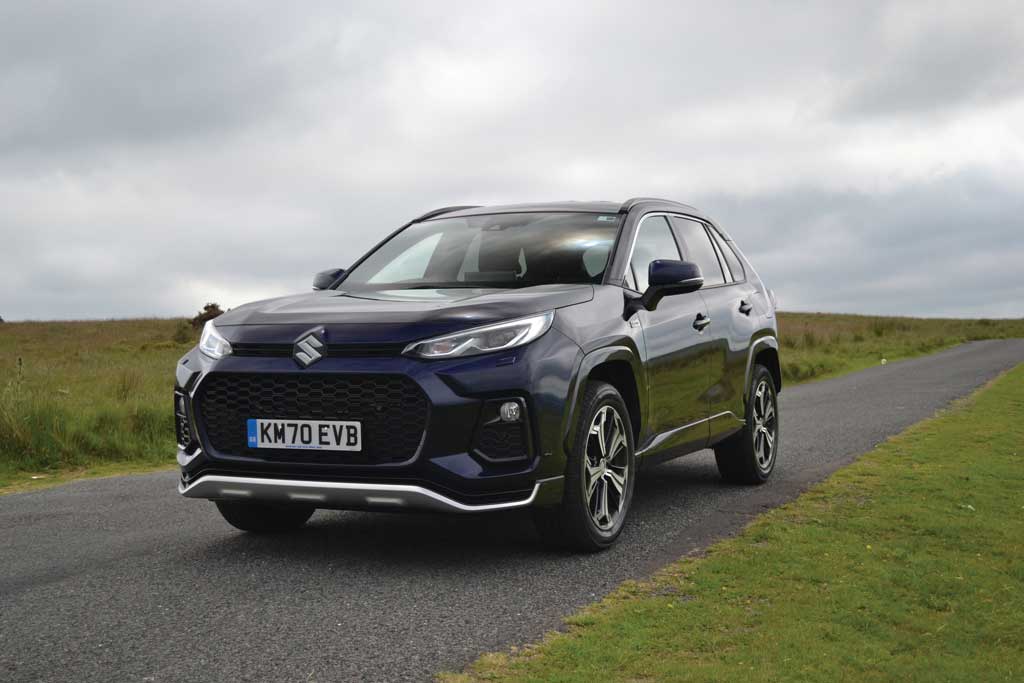
It doesn’t feel like such a long time ago that, with a couple of new SUVs on the way, traditionally retail sales-weighted Suzuki was sizing up fleet opportunities with some competitive diesel engines. That groundwork and relationship-building has held firm in the meantime, but hybrids are at the forefront today and the Across has to appeal to company car drivers who – in many cases – won’t have had a Suzuki beforehand.
Her Majesty’s Treasury is keen to get drivers into plug-ins, so this large SUV has almost the full weight of tax incentives behind it. In short, company car tax is a percentage of the list price, weighted by CO2 emissions and, for plug-in hybrids, the electric range too. The Across roughly has a 50% larger battery than its closest rivals, corresponding to a longer electric range and 7% company car tax banding, where most come in at 11%. To put that into context, higher-rate taxpayers able to opt into a £46,000 company car would be liable for £106 per month in benefit in kind tax. That’s actually less than a base-specification Ignis, which falls into the 26% company car tax band and would cost £123 per month for the same driver. So, it’s hardly surprising to see plug-in hybrid demand is on the up.
Of course, there are well-documented downsides for over-incentivising plug-in hybrids without also encouraging proper usage. My still-limited travelling suits it well, offering plentiful charging opportunities and mostly-local journeys – if anything, Suzuki’s claimed 46-mile electric range is pessimistic and I’d need to make an effort to go far enough to require the petrol engine. However, longer journeys are dropping back into my diary now, and that’s where the use case can start to wobble.
Being based on the RAV4 PHEV, Suzuki has Toyota’s hybrid system in its corner, and that’s a good thing. The Across offers four-wheel drive using an electric rear axle and a hybridised 2.5-litre petrol engine up front. There’s enough electric power for motorway driving without accidentally firing up the engine under load, and a borderline-unnecessary 302bhp with everything working together. It’ll accelerate like a hot hatch but, despite the promises of the over-firm ride quality, spirited drives aren’t its forté.
However, it is surprisingly efficient. Point the Across at a motorway stretch with the battery range depleted and it’ll hum along quite happily, finding occasional opportunities to slip into electric mode. It’s even better around town, where the instrument cluster typically shows the engine is switched off for around half of the journey. Average fuel economy in the low-to-mid 40s to the gallon is higher than most rivals and there’s a 55-litre fuel tank to take the range anxiety out of longer trips. That’s a common compromise for plug-in hybrids.
Fleets have, of course, been early adopters of this technology – and with mixed success. But the extended range stemming from cost advances in battery technology, and the backup of a genuinely efficient hybrid system broaden the use cases where this could stack up versus a diesel. It wasn’t so long ago that this would have been harder to argue.
Date arrived 6th May 2021
Mileage 6,788
Economy 282.4mpg
Economy (On test) 192.9mpg
© Motorworld Media 2023
Registered Office: 4 Capricorn Centre, Cranes Farm Road, Basildon, Essex. SS14 3JJ
Company Number: 8818356
Website designed by Steve Dawson